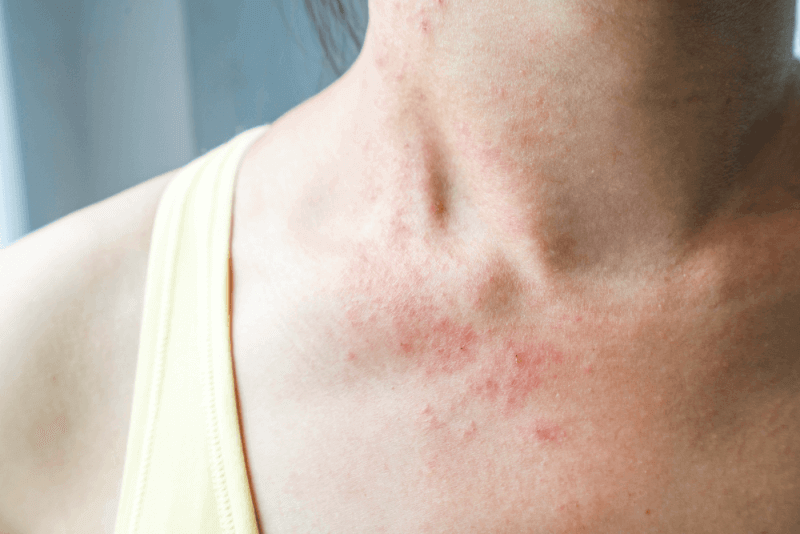30-Second Summary
- Canker sores can occur on the tongue, gums, palate, or inside the lips. These painful ulcers can make eating and talking difficult.
- Also known as aphthous ulcers, canker sores are small, shallow ulcers that appear on the inside surfaces of the mouth.
- Lack of adequate folate, vitamin D, and vitamin B12 can also lead to frequent occurrences of canker sores in infants and children. Additionally, stress is observed to trigger the formation of canker sores in babies and children.
- Small canker sores usually do not require treatment and typically resolve on their own within 1-2 weeks. However, large, persistent, or unusually painful canker sores may require medical attention.
What Are Canker Sores?
Canker sores, also known as aphthous ulcers, are small, shallow ulcers that form on the inner surfaces of the mouth. They start as red-rimmed white or yellowish lesions. They are usually smaller than 1 millimeter but can grow up to 2-3 centimeters in diameter.
Canker sores can occur on the tongue, gums, palate, or inside the lips. These painful ulcers can make eating and talking difficult. There are two types of canker sores. The first type, simple canker sores, may appear 2-3 times a year and can take up to a week to heal. Complex canker sores are less common but occur more frequently in people who have had them before.
Canker sores can appear in people of any age and gender, but they are more common during adolescence and in the 20s. They are also more likely to appear in females than in males.
Canker Sores in Infants and Children
Infants, especially those between 0 to 3 years old, frequently put everything they find in their mouths as they explore their surroundings. This can lead to the formation of mouth ulcers. Inadequate intake of folate, vitamin D, and vitamin B12 can also frequently cause canker sores in infants and children. Stress can also trigger the formation of canker sores in babies and children. Other factors that can lead to mouth ulcers in infants and children include:
- Diabetes
- Chronic illnesses
- Incorrect use of toothpaste
- Weak immune system
- Poor nutrition
- Mouth injuries
- Viruses
- Bacteria
- Consumption of hard or acidic foods
- Hormonal imbalances
Causes of Canker Sores
Some people are more prone to canker sores, though the underlying causes are not fully proven. However, many factors are known to trigger the development of these mouth ulcers, including:
- Stress
- Mouth injuries
- Acidic foods
- Non-steroidal anti-inflammatory drugs like ibuprofen
- Ill-fitting dentures or braces
- Dental appliances
- Dental treatments
- Excessive brushing
- Sports accidents
- Toothpastes containing SLS
- Sensitivity to foods such as chocolate, coffee, strawberries, nuts, and cheese
- Allergic reactions to bacteria in the mouth
- Helicobacter pylori, which can also cause peptic ulcers
- Hormonal changes during the menstrual cycle
Additionally, people with immune system deficiencies may develop complex canker sores. These diseases include:
- Lupus
- Behçet's disease
- Celiac disease
- Ulcerative colitis
- Crohn's disease
- AIDS
Canker sores can also be linked to deficiencies in vitamins and minerals like vitamin B12, zinc, folic acid, or iron.
Symptoms of Canker Sores
Common symptoms of canker sores include:
- One or more painful sores inside the mouth
- Burning and tingling sensations
- Small ulcers with a red border, appearing white, gray, or yellow
In severe cases, symptoms may include:
- Fever
- Physical lethargy
- Swollen lymph nodes
Canker Sore Treatment Methods
Small canker sores typically do not require treatment and usually heal on their own within 1-2 weeks. However, large, persistent, or unusually painful canker sores may require medical attention. There are several methods used in the treatment of canker sores.
Mouth Rinses
For multiple canker sores, mouth rinses containing dexamethasone can be prescribed to reduce pain and inflammation. Lidocaine can also be prescribed to alleviate pain.
Topical Products
Over-the-counter or prescription pastes, creams, gels, or liquids can be applied as soon as sores appear to help relieve pain and speed healing. These products are applied directly to the sores.
Oral Medications
Oral medications are used when canker sores are severe or do not respond to topical treatments. These include:
- Medications not specifically made for canker sores but proven effective, such as sucralfate used for intestinal ulcers and colchicine used for gout treatment.
- Severe canker sores that do not respond to other treatments may require oral steroids, which are used as a last resort due to serious side effects.
Cauterization of Sores
Cauterization of the sores involves the use of special devices or chemicals.
- Chemicals used for cauterizing canker sores also serve as a topical solution used in gum treatment. This chemical can reduce the healing time to a week.
- Silver nitrate is also used for cauterization, though it does not speed healing but helps alleviate pain.
Nutritional Supplements
If tests show deficiencies in vitamins such as folic acid, B6, and B12, or minerals like zinc and iron, nutritional supplements can be prescribed.
Canker Sore Diagnostic Criteria
A physical examination is generally sufficient to diagnose canker sores. However, various tests may be required to identify other health issues in cases of severe ulcers.
What Helps Canker Sores?
Here are some home remedies that can be applied for canker sores:
- Rinsing with saltwater or baking soda solution
- Applying diluted hydrogen peroxide to the sores with a cotton swab
- Drinking plenty of fluids
- Avoiding acidic, spicy, hot, or sour foods until the canker sore heals
- Avoiding toothpastes containing sodium lauryl sulfate (SLS)
- Staying away from stress
- Avoiding hot drinks
- Gargling with chamomile or sage tea
- Consuming yogurt
- Applying honey to the sores
- Using a cold compress to relieve pain
- Chewing basil leaves can help the sores heal faster
- Applying mint oil on the sores
- Applying coconut oil on the sores
- Sucking on mulberries
Types of Canker Sores
Canker sores can be classified into three different types:
Minor Canker Sores
The most common type of canker sore. Characteristics include:
- Usually small in size.
- Oval-shaped with a red border.
- Disappear without leaving a scar within 1-2 weeks.
Major Canker Sores
Less common, major canker sores are larger and deeper. Characteristics include:
- Larger and deeper compared to minor canker sores.
- Usually round with defined edges, but edges may be irregular if very large.
- Can be extremely painful.
- Healing can take up to 6 weeks.
- May leave scars.
Herpetiform Canker Sores
Rarely seen, these occur later in life and are not caused by herpes virus infection. Characteristics include:
- Pinpoint size.
- Usually appear in clusters of 10 to 100 sores.
- Can merge into a single large ulcer.
- Have irregular edges.
- Heal without leaving a scar within 1-2 weeks.
Where Do Canker Sores Occur?
Canker sores appear inside the mouth. Possible locations include:
- Tongue
- Underneath the tongue
- Gums
- Palate
- Uvula
- Roof of the mouth
How to Prevent Canker Sores
While there is no guaranteed method to prevent canker sores, the following points can help reduce the risk:
- Avoid acidic, salty, or spicy foods
- Maintain oral hygiene
- Address potential vitamin and mineral deficiencies.
- Manage stress effectively.
- Opt for healthy food choices.







